Interviews
Carl L. Hart: “Cannabis is a substance that many adults use to relax and as adults we have the right to be autonomous and have freedom of choice”
Published
11 months agoem

Psychologist, neuroscientist and teacher of the Department of Psychology in Psychiatry at university of Columbia, in New York (USA), Carl L. Hart is known worldwide for his unconventional positions in relation to drugs and the correlation between substance use and psychoses. With critical reviews, scientific articles and books published in the field of neuropsychopharmacology, Hart defends the human being's right to consume recreational drugs, given that individual freedom is a fundamental right that must be safeguarded.
We spoke with Carl L. Hart during the conference PTMC – Portugal Medical Cannabis, in Lisbon, and at Cannabis Europa, in London, in June 2022. The long conversation addressed his vast personal experience with substances and his last published book, “Drug Use for Grown-Ups: Chasing Liberty in the Land of Fear ”, in which Hart introduces himself as “a responsible professional who happens to use drugs in his pursuit of happiness”.
This interview by Margarita Cardoso de Meneses and Laura Ramos was originally published in issue #7 of Cannadouro Magazine.
Where does your interest in the relationship between drugs and psychoses come from?
From the age of 17 to 21, between 1984 and 1988, I was in the military, and at that time, in the USA, the big issue was addiction to crack (cocaine paste). At that time, I started studying psychology, becoming interested in the brain, and I thought that if I learned something about the brain and drugs, I could help people in my community who were addicted to crack. I started by studying the effect of drugs on the brain and then went on to do a Ph.D to study the subject better. That's how my interest started.
There is a lot of literature on drug use in the military and in war settings. Were you sent on a mission?
In the years I was in the army, the situation was relatively stable and I didn't go to any wars. But there are plenty of studies on the relationship between drug use and stress on the battlefield; many US Military studies in Vietnam with soldiers who used heroin during the war, but when they returned they stopped using it... The conclusions go in the direction that, in certain circumstances, under stress, one can use that substance and stop using it. use when things change, something we already know in Pharmacology.

Carl L. Hart was in Lisbon, in June 2022, invited by PTMC – Portugal Medical Cannabis. Photo: Renato Velasco | PTMC
Regarding heroin specifically, you say your opioid use makes you a better person…
Yes, you read that (laughs). Good Good. Well, we can think of any drug use by anyone – be it cannabis, MDMA, whatever. When we consume it we feel happier and more relaxed, it releases anxiety and if I feel better I will be more likely to treat others better. It's in that sense that I mean it, not that the heroine has magical powers to make people better. These drugs help us to be more magnanimous, more understanding, more generous and help us to see the humanity in others more clearly.
And what about addiction, because it's something that really happens, is it true that certain drugs are more addictive than others?
Yes… but let's think about alcohol dependence. Alcohol is probably the most dangerous of all drugs. When you stop drinking abruptly or have a hangover, you can die. None of the other drugs have this effect – nor will heroin ever lead to a death situation. Nobody asks about dependence when drinking alcohol, so why ask this question with heroin? Because it is illegal and people have to overcome many barriers to obtain it, which makes the commitment to it even stronger. And then, the quality can vary a lot and that means that people can decide to inject right away, because then the quality doesn't matter so much. That is, all this has more to do with the fact that the drug is illegal than with the drug itself.
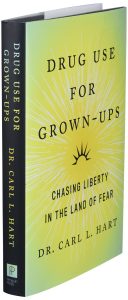 So dependency is a non-issue…
So dependency is a non-issue…
For me, a person using heroin and opioids is really a non-issue. I have a lot of responsibilities and I'm too vain to stick needles in my veins, plus I'm terribly afraid of needles… People ask that because what we usually see are people who use heroin and who live on the margins of society. People like me will never admit to using heroin because of the stigma, but there are more people who use it than meets the eye – and they are not drug addicts! Anyone who has had surgery has already taken opioids and when you do something for the first time you should always do it in small amounts, with someone you know. But nobody should inject drugs. If you want to feel the effect of heroin, the best thing is to smoke it. It's much simpler and the effect wears off quickly. And if it is of good quality, you can inhale it.
That is, those who use heroin can function perfectly in society. If drugs were legal and controlled, wouldn't people tend to adopt risky behaviors such as using needles?
Society is already functioning with people who use heroin. This already happens, but we pretend that it does not happen. I have been consuming for several years and taking care of my family, writing books and articles and doing science. In Switzerland there are clinics where people are given heroin as part of the treatment. We're talking about hundreds, maybe thousands of people who were taking heroin every day – and we're not talking about small doses – they were taking a gram, a thousand milligrams a day. And there are no overdoses, nor do they have any problems, because there is no adulteration of the substance or variations in quality, nor do they have to think about where they are going to get their next shot.
Os dealers sometimes they also encourage people to consume other substances, as has happened with Fentanyl…
Maybe so, but I prefer not to blame the dealers. Their interest is that they are well and pay. But sometimes the dealers “low level” agents also do not know if the substance is adulterated and, in these cases, it can be dangerous, of course. If you have heroin and it turns out to be fentanyl, it can be problematic because it is much more potent and with the same amount you can take a overdose. The crux of the matter here is, again: quality control. We could deal with this issue if we were committed as a society, but I don't think politicians and health professionals care too much. We say we care about people living on the fringes of society, but many of us want to make ourselves feel better by saying that we are doing service and we don't see the humanity in them as we see our own. If we saw it, we would be fighting for them to have quality substances. Instead, we say, “Oh, I'm protecting you from yourself,” which is very arrogant and patronizing.
“We say we care about people who live on the margins of society, but … we don't see the humanity in them as we see our own. If we saw it, we would be fighting for them to have quality substances.”
In your personal case, how often do you use heroin?
I don't know. Thinking about the pandemic, it was very difficult, you couldn't get heroin. But when I'm in Europe, several times a week if there's a really good thing.
And smoke?
No, I inhale.
And how do you control the quality?
Yes, there are places where you can go [do the drugcheck]. But the person who supplies me always has quality, so I trust him.
What do you feel when you take heroin and why do you feel the need to use it?
I don't feel the need (laughs). That's like asking, "why do you feel the need to drink alcohol?"
You just want…
Well, with cannabis, for example, what I like is that it helps me to be present, in the moment, so if I'm listening to music, I hear every instrument in the song. That's what's beautiful, my mind tunes in. What I like about heroin is a bit similar: it helps me to be present, but I can think about people's humanity and if I've done something wrong or hurt someone during my day. And of course it helps relieve anxiety – that's what opioids do – and it also causes euphoria, but it's more relaxed, like MDMA or amphetamine: you're energetic, but it's a euphoria cool, without anxiety. And I, who love my inner world, can do a review and be sure I haven't hurt anyone. That's what I like about heroin.
So what if you realize you've hurt someone what do you do next?
Ah, then I'll make sure I correct my mistake, apologize, or find the best remedy for whatever I've done.
And with MDMA, what is your experience?
MDMA is a drug I use with my wife because it's her drug of choice. It gives us the opportunity to reconnect in life and all things that happen and allows us to experience together.
Do you use other drugs?
Yes, in my book I talk about all drug classes, from cocaine to some psychedelics, to NDP (new psychedelic drugs), cathinones, I mean all these drugs. I wanted to know what they were like, so I took them.
But do you regularly consume more cannabis, heroin…?
No, I regularly think I use more amphetamines, because I work and that's all I do: write and work, 12 hours a day, so I take amphetamines to write.

Carl Hart at Cannabis Europe, London, 2022. Photo: Laura Ramos | cannareporter
How do you manage not to become dependent on any of these substances?
So, the medical definition of addiction is when consumption alters psychosocial functioning – that is: work, family, everything that is important to the person –, and the person fails to fulfill obligations and is disturbed by it. And they ask me if I'm worried about addiction? Of course! I know my children, I have to be there for them, take care of them, and that comes first. I know I have to work to take care of them… so those things come first: family, work. And then I come, my interests. Therefore, I don't worry about dependency because it's not an option for me.
Returning to cannabis, at the round table he participated in at PTMC, he said that he is always asked the same silly question about the relationship between cannabis and psychoses. What, then, is the million dollar question about this correlation?
This subject is very disconcerting, because this statement has been around for about a hundred years and has no scientific basis, but it is perpetuated and there are even credible scientists who claim that this relationship exists, although the data we have do not corroborate it. It's true that with cannabis you can get paranoid, we know this. We also know that some people have problems and there are correlations, ie people who use cannabis have a psychotic disorder. But they may have a family history of psychoses, they may have some predisposition, and then some of these credible scientists are led to think that cannabis causes psychoses and there's no evidence to say that. What you can tell people is that if they are inexperienced and use cannabis in large amounts, they can become paranoid, anxious and so on. But the best thing is to stay calm and eventually the substance will move away from the receptor and they will return to their normal state. If you tell people that drugs can drive you crazy, they can drive themselves crazy, even without cannabis! The power of the mind is incredible. Therefore, Based on the evidence, I do not believe that cannabis causes psychoses. But I do know that cannabis can trigger anxiety and paranoia and that these are temporary states.
Basically, the most important thing is to give people tools to deal with this altered state.
Yes, absolutely. I think my next book is going to be exactly one "how to”. I tried to stay clear of that in my previous books because I didn't want people to say that I'm promoting drug use, but with this book I learned that it doesn't matter what you write because people will always say that you're promoting drug use, so fuck them!
This is harm reduction, because a lot of people use drugs, so if you're going to do it, let them know. We must be pragmatic, because in fact consumption has not stopped and will not stop.
Yes, in fact I was very disappointed to see, here in Europe, how many people are still in the closet regarding drug consumption. I thought that in the US we were the most hypocritical, but we are not. Europe has been a disappointment. In Scandinavia and in those northern countries they don't even want to publish my book because of these gatekeepers. Even your questions about heroin show the ignorance that persists on this subject. I go to the gym, I take care of myself, I work and people are surprised…
“There is this belief that when you increase the potency of cannabis, you increase psychoses. This seems logical, but it is very silly. Let's think about beer and vodka: you don't drink those two things the same way.”
Here in Portugal, in the 80s, heroin addiction was a real pandemic, and, in fact, it was this problem that led to decriminalization. Heroin was a new thing, which took everyone by surprise, with dire consequences for every family. That's what prevails in people's minds.
Yes, I think worldwide. But I think this is a failure of the medical community. They didn't help people understand why people were injecting a drug. If they inject, that tells us something about the problem. It means that the quality varies, that the heroin is low quality, and that there are bigger problems than just the drug.
Returning to cannabis, What then is the biggest myth in the psychiatric field about the relationship between consumption and psychoses?
There's this belief that when you increase the potency of cannabis, you increase psychoses. This seems logical, but it is very silly. Let's think about beer and vodka: these two things are not drunk in the same way. The same goes for higher potency cannabis: people don't need to smoke as much, so that can be a good thing. This notion that if we increase potency we will have more psychoses contradicts Pharmacology and medicine has promoted this nonsense. Therefore, it is very important to teach people some basics of pharmacology.
“Psychiatry is the worst form of medicine. They are idiots! We don't want them to have control. Psychiatrists are policemen with stethoscopes.”
Does the dose matter then?
Yes, the dose matters. That's exactly what matters.

Photo: Renato Velasco | PTMC
And are teenagers more likely to suffer psychotic breaks if they consume cannabis with greater potency than adults, whose brains are already formed?
This is another misleading conclusion. When we talk about the adolescent brain, we are talking about the prefrontal cortex, which is important for planning and complex cognitive processes. This part develops later than the others. So, what some scientists say – and here you see how having just a little knowledge can be very pernicious – is that smoking cannabis alters the development of the prefrontal cortex, which is nonsense! Point number one: development doesn't happen the same way for everyone. My children, for example, had more experience with planning and complex cognition as children than many adults. Point two: We don't raise these concerns when we give children antidepressants and antipsychotics. So what are we talking about? Is that only said with cannabis? Does not make sense. When we think about disruption of prefrontal cortex development, it would have to be large doses and we would have other problems before that. So you are misleading people. They have some knowledge and they pretend that they are very smart, knowledgeable and intelligent, but it is very stupid. Why aren't they concerned about the effects of antidepressants or prescription drugs for attention deficit disorder? They all affect the brain. Obviously, if you have kids who are smoking cannabis every day and they're at school, it's not good. Parents will have to do a better job, because this isn't about cannabis, it's about parents. But it's always a matter of dose. Always the dose.
How did you educate your children about drugs? Did you teach them how to make the right decisions?
In fact, we never talked much about drugs. When they were kids I would give people drugs in the lab and they would come with me, I would administer cannabis or other drugs and then we would stand behind a mirror and talk about what was going on. But it wasn't an issue. The subject was how they were getting along at school.
In his lecture he said that “cannabis has the potential to be therapeutic, but that should not be the case. standard to make it accessible”. What should the standard be?
What is the standard to make alcohol accessible? Can we say, for example, that alcohol cures cancer and therefore must be accessible?… Of course not! People use it recreationally and that's the standard. People want it and so it must be affordable. Just that.
But this is the only one standard what should there be? People want it, so should we make it affordable?
Well, first of all, we know that it's not just dangerous, that is, it's not like a drug called MPTP, which selectively kills dopamine cells, and when that happens a person can develop Parkinson's disease. This is dangerous and we know it. Cannabis is not like that. Therefore, knowing that cannabis is not in itself dangerous and people are looking for it, why shouldn't we make it available, ensuring it's as safe as possible? We make food and processed foods available ensuring they are safe and unadulterated. Cannabis is a substance that many adults use to relax and as adults we have the right to try to control our inner world, the right to be autonomous and to have freedom of choice.
“Why aren't they concerned about the effects of antidepressants or prescription drugs for attention deficit disorder? They all affect the brain.”
Perhaps even television is more dangerous than cannabis…
Certainly. But there are also people who learn things from television and it should also be available. We don't want to be patronizing and say, “oh, alcohol is so dangerous…”. Yes, it can be, but most people enjoy the substance without having any problems; so we don't want to make laws based on a minority that is having problems and ban the substance for all of humanity. It's silly.
How do you see the use of cannabis in Psychiatry in the future? Do you think that, just as microdosing LSD is now being used to treat post-traumatic stress, cannabis also has potential?
We do not want to see cannabis in the hands of psychiatry. Any drug in the hands of psychiatrists is going to be a problem. Psychiatry is the worst form of medicine. They are idiots! We don't want them to have control. Psychiatrists are policemen with stethoscopes. They have a huge inferiority complex – they are not surgeons, they are not another type of doctor – and so they feel that they have to control these substances. But your education sucks, pharmacology not as good as it should be…. It's like they say in French, purpose: its raison d'être is to save us from ourselves – that is the mission of psychiatry. But we don't need to be saved.
Two things that stand out about LSD microdosing treatments, especially soldiers with PTS, is that they all say they feel love and that they find healing within themselves, not outside. So, are these treatments even positive, or not?
Yes. That's very interesting, but I think you can get these results with a wide range of drugs, not just LSD or MDMA. That tells us more about society than it does about drugs. What do we ask of these soldiers… they had to kill and watch people being killed, so they must be really traumatized! We test these things out on a group of participants that society feels guilty about and cares about, because it will increase the likelihood that these types of studies will be accepted. Imagine that we test MDMA on a group of black Americans, traumatized by the shit that happens to them in life, and they feel better and find the cure in themselves… nobody would be interested! It's all a game. They are playing with people's lives. I've been studying drugs for 30 years and it's very disturbing.
____________________________________________________________________________________________________
[Disclaimer: Please note that this text was originally written in Portuguese and is translated into English and other languages using an automatic translator. Some words may differ from the original and typos or errors may occur in other languages.]____________________________________________________________________________________________________

What do you do with €3 a month? Become one of our Patrons! If you believe that independent cannabis journalism is necessary, subscribe to one of the levels of our Patreon account and you will have access to unique gifts and exclusive content. If there are many of us, we can make a difference with little!
-
Laura Ramoshttps://cannareporter.eu/author/partner/
-
Laura Ramoshttps://cannareporter.eu/author/partner/
-
Laura Ramoshttps://cannareporter.eu/author/partner/
-
Laura Ramoshttps://cannareporter.eu/author/partner/
-
Margarita Cardoso de Meneseshttps://cannareporter.eu/author/margarita/
-
Margarita Cardoso de Meneseshttps://cannareporter.eu/author/margarita/
-
Margarita Cardoso de Meneseshttps://cannareporter.eu/author/margarita/
-
Margarita Cardoso de Meneseshttps://cannareporter.eu/author/margarita/
Related News
-
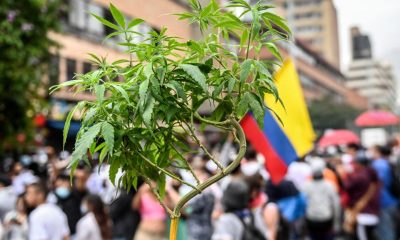

Colombia: Cannabis Legalization Approved by the Chamber of Deputies, Heads to the Senate
-
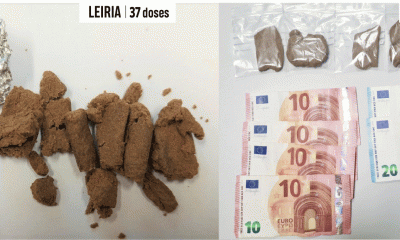

Quantification of hashish “doses” varies in different GNR Territorial Commands
-
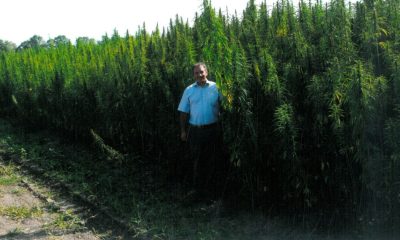

Ukraine launches project for a hemp industrial park
-
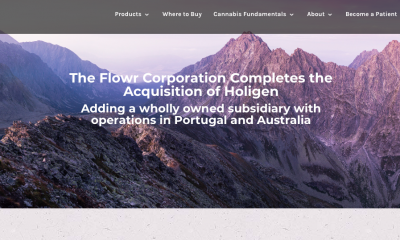

Canadian Flowr completes acquisition of Holigen Holdings
-
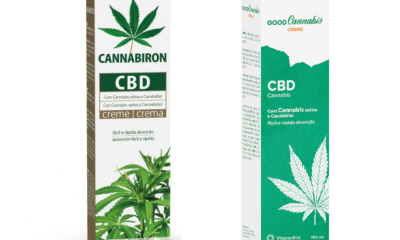

Portugal: Infarmed withdraws two cosmetics with CBD from the market
-


Recipe: Cannabis berry gummies

Mais recentes


Álvaro Covões, who acquired land from Clever Leaves, says he has “no interest in growing cannabis”
At the beginning of April, we reported that Álvaro Covões, founder and CEO of 'Everything is New', had purchased the land where he was located...


Portugal's regulatory advantage in the cannabis industry
In the dynamic landscape of European cannabis cultivation, Portugal has emerged as an interim leader. Although it shares many natural advantages with...


ICBC Berlin shines again. It's the beginning of a new era for the cannabis industry in Germany
ICBC Berlin was the first major international cannabis conference to take place after the legalization of adult use in...


USA: Mike Tyson products recalled for mold contamination
California authorities have issued a mandatory recall notice for two products from Mike Tyson's cannabis brand,...


4:20 is coming and there are celebrations in Porto and Lisbon
The date for celebrating cannabis culture is approaching! This Saturday, April 20th, is the day when...


Paul Bergholts, alleged leader of Juicy Fields, detained in the Dominican Republic
Paul Bergholts, the alleged leader of the Juicy Fields pyramid scheme, has been detained in the Dominican Republic and will be subjected to...


Cannabinoids reveal promising results in the treatment of Borderline Personality Disorder
An investigation carried out by Khiron LifeSciences and coordinated by Guillermo Moreno Sanz suggests that medicines based on...


Juicy Fields case: 9 detained by Europol and Eurojustice. Scam exceeds 645 million euros
A joint investigation conducted by several European authorities, supported by Europol and Eurojust, culminated in the arrest of nine suspects...


Regular cannabis users may require more anesthesia during medical procedures
Regular cannabis users may require more anesthesia during medical procedures to remain sedated compared to...


The future of CBD in Japan: How legal reforms will shape the market
Late last year, Japan took a big step towards cannabis reform after approving...







